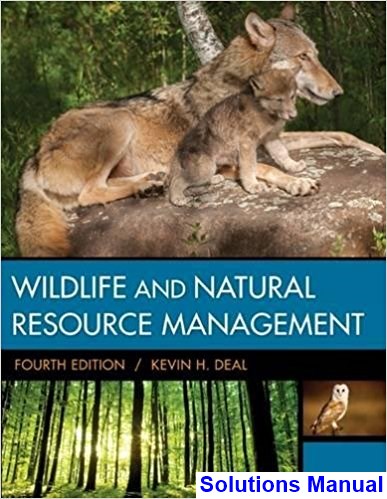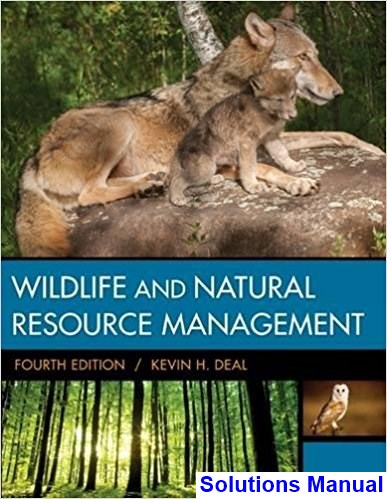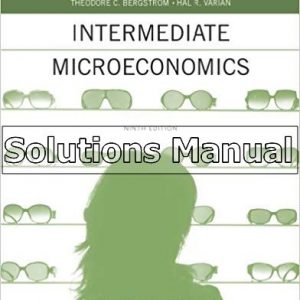This is completed downloadable of Wildlife and Natural Resource Management 4th Edition Deal Solutions Manual

Product Details:
- ISBN-10 : 1305627741
- ISBN-13 : 978-1305627741
- Author: Kevin H. Deal
Understand how professionals manage the natural world with WILDLIFE AND NATURAL RESOURCE MANAGEMENT, 4E! From running fisheries and national parks to studying the environment and resources conservation, career opportunities abound in this growing field. In addition to professional perspectives, this all-new fourth edition encourages you to explore your wild side with vibrant, full-color photos and illustrations of animals, habitats, and endangered species, including ways to identify each. As our human population continues to grow, the pressure on natural resources will inevitably increase. In the past thirty years humans have come a long way in terms of managing fish and wildlife, conserving soil, and protecting the water supply, but it is up to future generations to continue that progress. WILDLIFE AND NATURAL RESOURCE MANAGEMENT, 4E shows you the path to that future and builds a greater appreciation for the natural world and its limited resources.
Table of Content:
- Ch 1: The History of Wildlife Management in America
- Ch 1: Objectives
- Ch 1: Introduction
- Ch 1: Terms to Know
- Exploitation
- Progress is Finally Made
- Serious Conservation Efforts Begin
- Ch 1: Summary
- Ch 1: Review Questions
- Ch 1: Learning Activities
- Ch 2: The Importance of Natural Resources
- Ch 2: Objectives
- Ch 2: Introduction
- Natural Resources— Renewable or Nonrenewable?
- Ch 2: Terms to Know
- The Role of Natural Resources in America’s Development
- Ch 2: Summary
- Ch 2: Review Questions
- Ch 2: Learning Activities
- Ch 3: Conservation: Wise Use of Natural Resources
- Ch 3: Objectives
- Ch 3: Introduction
- Ch 3: Terms to Know
- Soil Conservation
- Forest Conservation
- Wildlife Conservation
- Fossil Fuel Conservation
- Mineral Conservation
- Water Conservation
- Ch 3: Summary
- Ch 3: Review Questions
- Ch 3: Learning Activities
- Ch 4: The Administration of Wildlife Management
- Ch 4: Objectives
- Ch 4: Introduction
- Ch 4: Terms to Know
- The U.S. Fish and Wildlife Service
- Endangered Species
- National Wildlife Refuges
- Migratory Birds
- Fisheries
- Habitat Protection
- Research
- Law Enforcement
- Administering Federal Aid
- The U.S. Forest Service
- The Bureau of Land Management
- The U.S. Department of Agriculture
- Ch 4: Summary
- Ch 4: Review Questions
- Ch 4: Learning Activities
- Ch 4: Additional Resources
- Ch 5: Habitat Requirements of Wildlife
- Ch 5: Objectives
- Ch 5: Introduction
- Ch 5: Terms to Know
- Food
- Cover
- Water
- Space
- Arrangement
- Ch 5: Summary
- Ch 5: Review Questions
- Ch 5: Learning Activities
- Ch 6: The Human Impact on Wildlife Habitat
- Ch 6: Objectives
- Ch 6: Introduction
- Ch 6: Terms to Know
- Wetlands Loss
- America’s Wetlands
- Prairie Potholes
- Forested Wetlands
- Coastal Wetlands
- Can Wetlands Be Saved?
- Native Prairies
- America’s Forests
- Habitat Alterations That Benefit Wildlife
- Ch 6: Summary
- Ch 6: Review Questions
- Ch 6: Learning Activities
- Ch 7: Wildlife and American Sport Hunting
- Ch 7: Objectives
- Ch 7: Introduction
- Ch 7: Terms to Know
- Funding at Last
- How the Act Works
- The Economic Impact of Hunting
- Private Conservation Organizations
- Ducks Unlimited
- Delta Waterfowl
- Ch 7: Summary
- Ch 7: Review Questions
- Ch 7: Learning Activities
- Ch 7: Additional Resources
- Ch 8: Modern Wildlife Management
- Ch 8: Objectives
- Ch 8: Introduction
- Ch 8: Terms to Know
- Factors That Affect Wildlife Populations
- Biological Surplus
- The Wildlife Manager’s Job
- Carrying Capacity
- Wildlife Management Successes
- Wildlife Management Practices
- Ch 8: Summary
- Ch 8: Review Questions
- Ch 8: Learning Activities
- Ch 8: Additional Resources
- Ch 9: Modern Waterfowl Management
- Ch 9: Objectives
- Ch 9: Introduction
- Ch 9: Terms to Know
- Waterfowl Migration
- Migration Routes
- Waterfowl Navigation
- Waterfowl Management Practices
- Factors That Limit Waterfowl Populations
- Ch 9: Summary
- Ch 9: Review Questions
- Ch 9: Learning Activities
- Ch 9: Additional Resources
- Ch 10: Endangered Species
- Ch 10: Objectives
- Ch 10: Introduction
- Ch 10: Terms to Know
- Extinction Factors
- Adaptability
- Species That We Have Endangered
- Why Save Endangered Species?
- The Endangered Species Act
- Management Practices for Endangered Species
- Wildlife Identification: Endangered Species
- West Indian Manatee (Trichechus Manatus)
- California Condor (Gymnogyps Californianus)
- Peregrine Falcon (Falco Peregrinus)
- Red Wolf (Canis Niger)
- Black-Footed Ferret (Mustela Nigripes)
- Whooping Crane (Grus Americana)
- Ch 10: Summary
- Ch 10: Review Questions
- Ch 10: Learning Activities
- Ch 11: Wildlife Parks and Zoos
- Ch 11: Objectives
- Ch 11: Introduction
- Ch 11: Terms to Know
- Early Zoos in the United States
- A More Natural Setting
- Modern Zoos and Wildlife Parks
- Ch 11: Summary
- Ch 11: Review Questions
- Ch 11: Learning Activities
- Ch 11: Endnote
- Section Two: Wildlife and Fish Identification
- Ch 12: Large Mammals
- Ch 12: Objectives
- Ch 12: Terms to Know
- Ch 12: Summary
- Ch 12: Review Questions
- Ch 12: Learning Activities
- Ch 13: Small Mammals
- Ch 13: Objectives
- Ch 13: Terms to Know
- Ch 13: Summary
- Ch 13: Review Question
- Ch 13: Learning Activities
- Ch 14: Nonindigenous Species
- Ch 14: Objectives
- Ch 14: Introduction
- Ch 14: Terms to Know
- Some Effects of Invasive or Nonnative Species
- Plants
- Amphibians and Reptiles
- Birds
- Mammals
- Ch 14: Summary
- Ch 14: Review Questions
- Ch 14: Learning Activities
- Ch 15: Upland Game Birds
- Ch 15: Objectives
- Ch 15: Introduction
- Ch 15: Terms to Know
- Quail (Phasianidae)
- Grouse (Tetraonidae)
- Migratory Upland Game Birds
- Ch 15: Summary
- Ch 15: Review Questions
- Ch 15: Learning Activities
- Ch 16: Ducks , Geese, Swans, and Cranes
- Ch 16: Objectives
- Ch 16: Terms to Know
- Ducks (Anatidae)
- Puddle Ducks
- Diving Ducks
- Geese (Anatidae)
- Cranes (Gruidae)
- Swans (Anatidae)
- Ch 16: Summary
- Ch 16: Review Questions
- Ch 16: Learning Activities
- Ch 16: Additional Resources
- Ch 17: Songbirds and Other Common Birds
- Ch 17: Objectives
- Ch 17: Introduction
- Ch 17: Terms to Know
- Ch 17: Summary
- Ch 17: Review Questions
- Ch 17: Learning Activities
- Ch 17: Additional Resources
- Ch 18: Avian Predators
- Ch 18: Objectives
- Ch 18: Introduction
- Ch 18: Terms to Know
- Owls
- Vultures
- Ch 18: Summary
- Ch 18: Review Questions
- Ch 18: Learning Activities
- Ch 18: Additional Resources
- Ch 19: Common Shorebirds, Herons, and Egrets
- Ch 19: Objectives
- Ch 19: Introduction
- Ch 19: Terms to Know
- Sandpipers
- Ch 19: Summary
- Ch 19: Review Questions
- Ch 19: Learning Activities
- Ch 19: Additional Resources
- Ch 20: Reptiles
- Ch 20: Objectives
- Ch 20: Introduction
- Ch 20: Terms to Know
- Alligator
- Turtles
- Lizards
- Snakes
- Common Nonpoisonous Snakes
- Poisonous Snakes
- Ch 20: Summary
- Ch 20: Review Questions
- Ch 20: Learning Activities
- Ch 21: Amphibians
- Ch 21: Objectives
- Ch 21: Introduction
- Ch 21: Terms to Know
- Frogs and Toads
- True Toads
- True Frogs (Rana)
- Ch 21: Summary
- Ch 21: Review Questions
- Ch 21: Learning Activities
- Ch 22: Freshwater Habitats and Their Management
- Ch 22: Objectives
- Ch 22: Introduction
- Ch 22: Terms to Know
- Fish and Wildlife
- Pollution
- Destruction of Freshwater Habitats
- Freshwater Habitats
- Aquatic Habitat Management
- Ch 22: Summary
- Ch 22: Review Questions
- Ch 22: Learning Activities
- Ch 23: Freshwater Fishes
- Ch 23: Objectives
- Ch 23: Introduction
- Ch 23: Terms to Know
- Minnows (Cyprinidae)
- Shad
- Gar (Lepisostedae)
- Salmon (Salmonidae)
- Trout
- Pike
- Cat Fish
- Sunfish Family
- Ch 23: Summary
- Ch 23: Review Questions
- Ch 23: Learning Activities
- Ch 24: Careers in Wildlife and Fishereies Management
- Ch 24: Objectives
- Ch 24: Introduction
- Ch 24: Terms to Know
- Selecting a Career
- Career Options
- Ch 24: Summary
- Ch 24: Review Questions
- Ch 24: Learning Activities
- Ch 24: Additional Resources
- Appendix A: U.S. Fish and Wildlife Service Offices
- Appendix B: State Conservation and Natural Resource Agency Offices
- Appendix C: Private Conservation Organizations
- Glossary/Glosario
- Index





